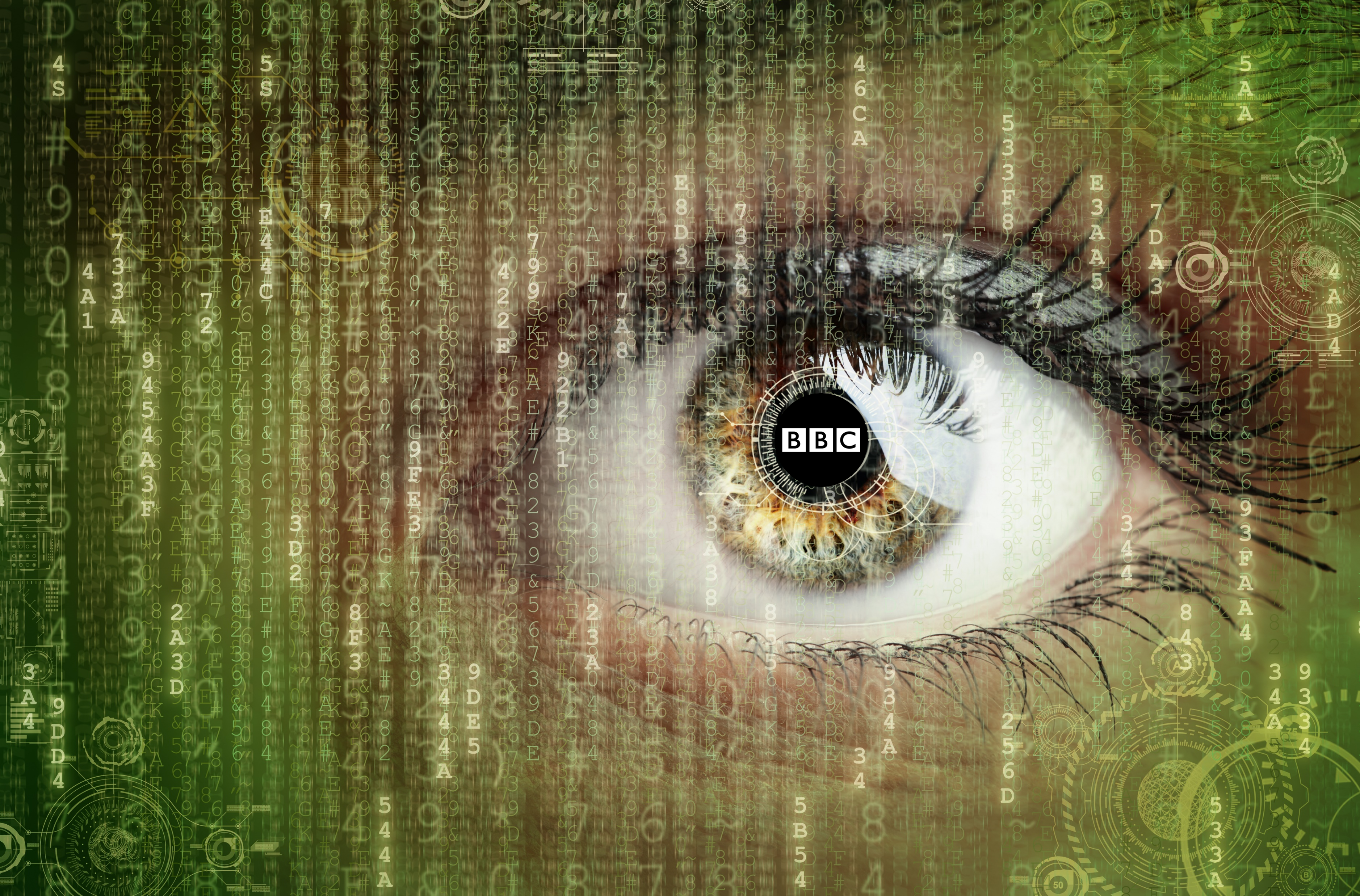
There are vision statements.
And then there are VISION STATEMENTS – big, sweeping plans for an uncertain future undertaken by one of the industry’s biggest media powers.
If you’re one of those skeptics who often wonders “But where’s the master plan?” look no further than Tim Davie, Director-General of the BBC. It was published last week, and continues to make waves in the UK and all over the world.
The BBC is perhaps the world’s biggest broadcast network, now more than a century old. And Davie is redefining how it will accomplish its mission, its legacy, and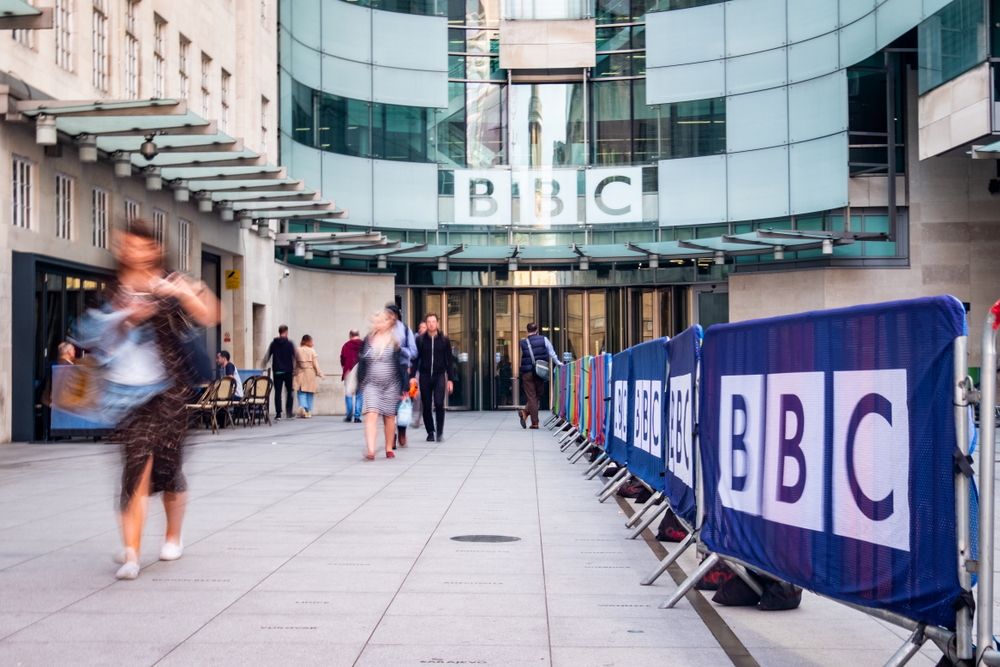 for nearly a half billion people all over the globe, how they will get their news.
for nearly a half billion people all over the globe, how they will get their news.
Clarifying a truth many of us share – that this is a defining moment for media everywhere – Davie made the case that for “the creative health of the nation” and for the future of democracy, the BBC proposes to dive into the future. A deep dive.
Davie’s proposal is to shutter the BBC’s traditional TV and radio broadcasts, moving to an online-only service over the next decade. Let that one sink in, Mr. and Mrs. Broadcaster.
A couple of key quotes from Davie to tee up this momentous change that would alter how so many of the world’s global citizens access their information, news, and entertainment:
“Imagine a world that is internet-only, where broadcast TV and radio are being switched off and choice is infinite. A switch-off of broadcast will and should happen over time, and we should be active in planning for it.”
The vision is for all the BBC’s assets to be aggregated together, perhaps in one app, fusing TV programs, local news, radio, and educational material.
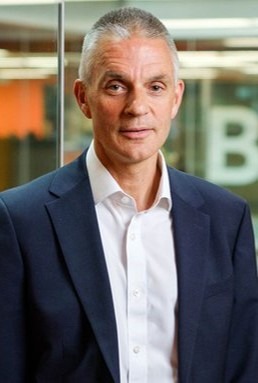
Is this as risky as it sounds? Maybe more than it sounds.
But among many of Davie’s concerns about the future is this one:
“Do we want a US-style media market or do we want to fight to grow something different based on our vision?”
(Hard swallow)
Davie notes how the internet has leveled the playing field, stripping the advantage of holding a broadcast license. Now, the definition of winning is “relevance” – not privilege. It must be earned by media outlets fighting for the consumer’s time and attention – not a scarcity of choice.
What’s on the line here?
EVERYTHING.
In the UK alone, “nearly 90% of adults, and 75% of 16-34s come to the BBC every week, and every month, nearly every adult uses (the service).” As Davie reminds, the BBC “remains bigger than Netflix, Amazon Prime, and Disney Plus combined.”
It will also mean fewer brands, with all its media assets coming under one umbrella in the UK – the BBC. And of course, simplification of “sub-brands such as BBC News” is slated to take place.
If you think your media organization is steeped in tradition, “the way we’ve always done it,” you can’t hold a candle to the BBC. And yet, Davie is pursuing this new vision with vigor and speed, summing up the institution’s future choices as follows:
- Move to an internet future with greater urgency
- Transform the BBC faster to have a clear, market leading role in the digital age
- Proactively invest in the BBC brand as a global leader
- Move faster in regulating for future success urgently
The other risk, of course, is that the BBC loses its dominance, its advantage. In the free Internet marketplace, victories are truly driven by the perceived value of the content. Our analogy of fixing the plane – in this case, a fleet of jumbo jets – while flying at 35,000 feet is just the beginning of the task:
content. Our analogy of fixing the plane – in this case, a fleet of jumbo jets – while flying at 35,000 feet is just the beginning of the task:
“Moving to digital is not the challenge in and of itself, moving to digital while not losing most of your audience and burning millions of pounds unnecessarily is the challenge.”
As the Guardian notes, despite the BBC’s reach, “almost all of its outlets are seeing long-term declines in their live audiences.”
If you’re writing off this bold proposal because the BBC is publicly subsidized, think again. Davie told the Royal Television Society the institution is “open-minded” to new funding models, including the abolishment of the license fee each UK household pays annually. It is now set at £159, steadily rising since 2000, but as Davie points out, not keeping up with inflation:
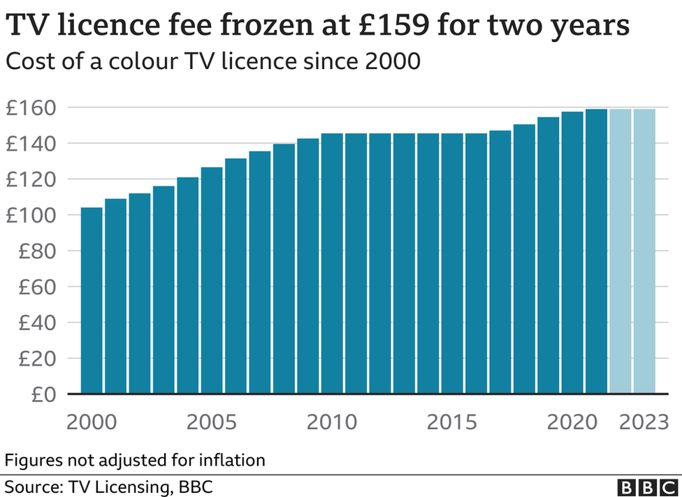
For Davie, an IP BBC’s success will hinge on access, relevance, and of course, engagement.
Risky? Of course.
But so is staying the course.
I urge you to read Davie’s speech to get a sense for just how sweeping the BBC’s vision is, and how media organizations of all shapes, sizes, and funding models will need to reimagine their futures.
It will ruffle feathers and rankle egos (and stock portfolios) among those who make their money (and fortunes) on maintaining the status quo. But leadership in 2023 – and beyond – will no doubt be defined by a clear-eyed boldness to face the challenges head-on with courage and wisdom.
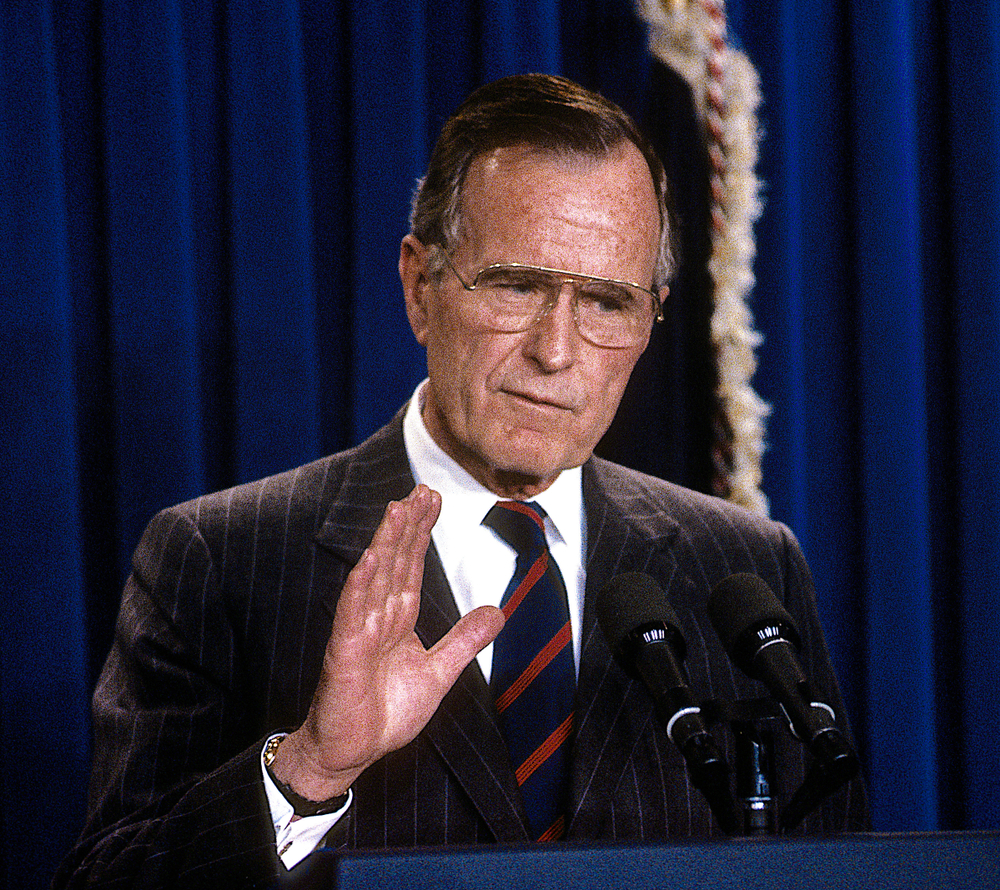 It is about the “vision thing” as President Bush 41 used to call it – the ability to imagine what the future will look like and how it will work.
It is about the “vision thing” as President Bush 41 used to call it – the ability to imagine what the future will look like and how it will work.
The former president struggled with it. That’s because, in fact, vision is a rare quality that few leaders truly possess in large quantities. And in the world of business, it is easy to shove it underneath spreadsheets, Wall Street analyses, and pressing quarterly goals.
But “same as it ever was” is not a workable plan. The future for media will not be a fun place for those who haven’t studied their industry, technology, and innovation.
So two things…
 This is why we make the trek to CES every year, and why we’ll be there with two sold out tours in tow, just three weeks from now. Its so essential to not just think about the future, but to immerse yourself in it for your company’s good, but also for your own career growth.
This is why we make the trek to CES every year, and why we’ll be there with two sold out tours in tow, just three weeks from now. Its so essential to not just think about the future, but to immerse yourself in it for your company’s good, but also for your own career growth.
And this spring, Canadian Music Week partners with Radiodays Europe for their annual extravaganza. The result will be Radiodays North America in Toronto in early June, a chance to learn about radio “across the bond,” and spend time with media mavens from around the world. Registration and info here.
extravaganza. The result will be Radiodays North America in Toronto in early June, a chance to learn about radio “across the bond,” and spend time with media mavens from around the world. Registration and info here.
Finally, you can read the BBC’s Davie’s speech here.
- What To Do If Your Radio Station Goes Through A Midlife Crisis - April 25, 2025
- A 2020 Lesson?It Could All Be Gone In A Flash - April 24, 2025
- How AI Can Give Radio Personalities More…PERSONALITY - April 23, 2025




Great Britain has a tiny landmass compared to the US, so creating ubiquitous internet coverage is a LOT easier. As we’ve seen in Russia, China, and other totalitarian nations, controlling access to information from beyond your borders is much easier if the internet is your only source of information. OTA broadcasting still has a place. Even shortwave broadcasting still reaches populations that have no internet access, and that population includes 47% of the people on earth! I guess it depends on if the intent of the BBC is to offer the world the British point of view or if it’s reach is restricted primarily to the British Isles and the free and technologically advanced nations of the world.
Brian, I’m not suggesting the US follow suit – only suggesting that vision requires expansive thinking, boldness, and risk-taking. I admire their vision, but I’m sure as hell not sure it’s going to work.
It all sounds very smart, and totally forward-thinking. And using the US as the undesirable ‘other’ smacks of classic rhetorical tactics. It’s a clever move. As mentioned, the terrain to cover is compact and manageable. It’s a good way to sell internet appliances to hoi polloi who do not have them yet. Once they get over the hurdle of the whole ‘infrastructure thing’, and that’s all it really is, then what? Expand the choices to the point where nothing achieves ROI? Bundle it all together as in the past anyway and charge for everybody for everything? What about local news for localities in more or less real time? I’m sure I am not in possession of all the relevant facts.
It does sound like a cool way to get more control. Especially if other broadcast outlets find themselves out in the cold. They can regulate and limit the harmful (depending on who you are talking to) opposing voices in the name of democracy. Or in the name of rhetoric. After all there is a good use for undesirable ‘others’ if you are trying to sell an idea and marginalize the opposition even if the opposition is not actually a real opposition. It’s all politics and advertising. To what end?
Maybe I have been around too long. Maybe I have seen too many laws, initiatives and referendums, or acts of congress that are named to obfuscate the real world effects. Let’s just say….I’m skeptical. I’m glad I don’t live in the UK. It could be a great success. Let’s see what happens next.
As Davie explained, making WiFi/Internet access available to all is a key part of this BBC plan.
I share your concern that when everyone can listen to everything, where’s the mass? It’s like what’s become of the music industry. Once you get beyond Taylor Swift and her cohort of pop stars, there not enough of a crowd to satisfy the needs of most performers.
And you’re right to be skeptical, Lalo. If there’s a way to twist and subvert this, someone will figure out how to do it. As you suggest, we may be better off letting them go first. Stay tuned.
Even though it’s separate, there’s another BBC-related issue that’s been making a lot of headlines–and which broadcasters elsewhere should pay attention to: its recently announced proposals to greatly consolidate much of the programming on the various BBC Local Radio outlets (plus the counterparts for Scotland, Wales, and Northern Ireland).
Gobsmacking for sure. A great vision. But it reminds me of the car makers that took advantage of “run flat” tires as an excuse to cut costs and eliminate the spare tire. A world without OTA broadcasting will see some listeners from time to time stranded on the side of the information highway when the internet goes (or is taken) down.
Speaking for myself, I’ll always be more comfortable with that spare tire in the back–a truly robust means of four-corner support.
I’d rather have a full-size spare myself, John. I agree with your assessment. There will be citizens left behind, something that shouldn’t happen in the US.
Along those lines…
https://www.radioworld.com/columns-and-views/guest-commentaries/in-praise-of-analog
What a great read, Eric. “If you lose one fader, you don’t want to lose all your faders. If you lose one studio or transmitter, you don’t want to lose ALL your studios and transmitters.” What a nice reminder at Christmas that radio shouldn’t be a medium where “if one light goes out, they all go out.” If anything, let’s be the one place where there’s a light ALWAYS on even when everything else goes down!